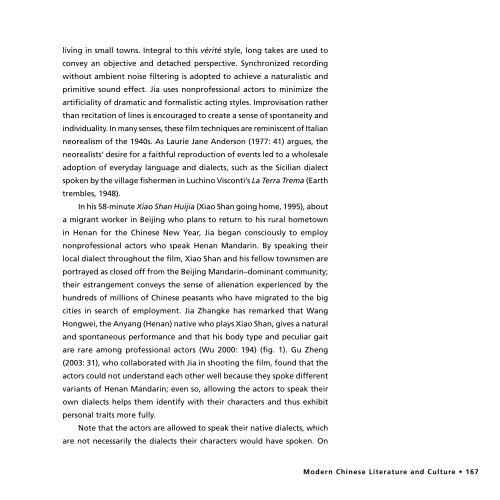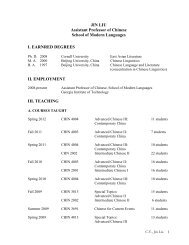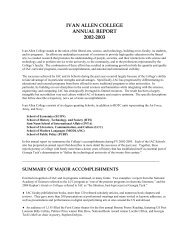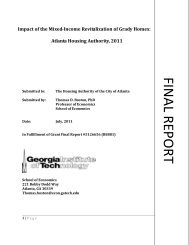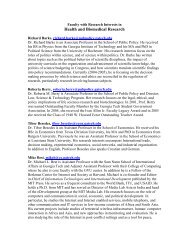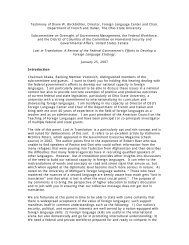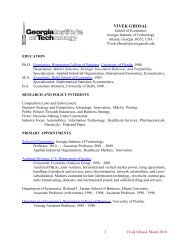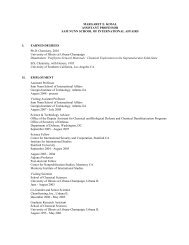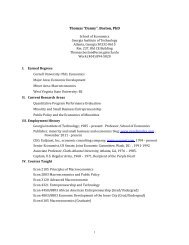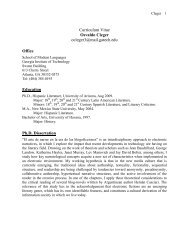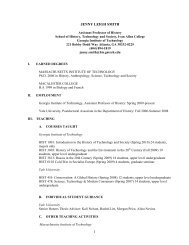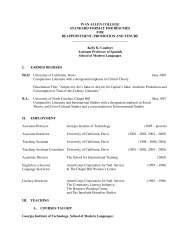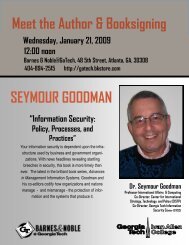Read this paper
Read this paper
Read this paper
Create successful ePaper yourself
Turn your PDF publications into a flip-book with our unique Google optimized e-Paper software.
living in small towns. Integral to <strong>this</strong> vérité style, long takes are used to<br />
convey an objective and detached perspective. Synchronized recording<br />
without ambient noise filtering is adopted to achieve a naturalistic and<br />
primitive sound effect. Jia uses nonprofessional actors to minimize the<br />
artificiality of dramatic and formalistic acting styles. Improvisation rather<br />
than recitation of lines is encouraged to create a sense of spontaneity and<br />
individuality. In many senses, these film techniques are reminiscent of Italian<br />
neorealism of the 1940s. As Laurie Jane Anderson (1977: 41) argues, the<br />
neorealists’ desire for a faithful reproduction of events led to a wholesale<br />
adoption of everyday language and dialects, such as the Sicilian dialect<br />
spoken by the village fishermen in Luchino Visconti’s La Terra Trema (Earth<br />
trembles, 1948).<br />
In his 58-minute Xiao Shan Huijia (Xiao Shan going home, 1995), about<br />
a migrant worker in Beijing who plans to return to his rural hometown<br />
in Henan for the Chinese New Year, Jia began consciously to employ<br />
nonprofessional actors who speak Henan Mandarin. By speaking their<br />
local dialect throughout the film, Xiao Shan and his fellow townsmen are<br />
portrayed as closed off from the Beijing Mandarin–dominant community;<br />
their estrangement conveys the sense of alienation experienced by the<br />
hundreds of millions of Chinese peasants who have migrated to the big<br />
cities in search of employment. Jia Zhangke has remarked that Wang<br />
Hongwei, the Anyang (Henan) native who plays Xiao Shan, gives a natural<br />
and spontaneous performance and that his body type and peculiar gait<br />
are rare among professional actors (Wu 2000: 194) (fig. 1). Gu Zheng<br />
(2003: 31), who collaborated with Jia in shooting the film, found that the<br />
actors could not understand each other well because they spoke different<br />
variants of Henan Mandarin; even so, allowing the actors to speak their<br />
own dialects helps them identify with their characters and thus exhibit<br />
personal traits more fully.<br />
Note that the actors are allowed to speak their native dialects, which<br />
are not necessarily the dialects their characters would have spoken. On<br />
Modern Chinese Literature and Culture • 167<br />
MCLC 18.2.indd 167<br />
12/20/06 2:01:34 PM


